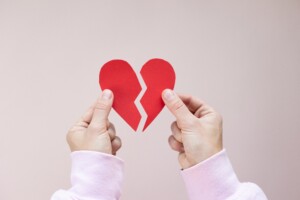 In a perfect world, we wouldn’t even be talking about family trauma. After all, a family is supposed to be safe, strong, and secure. Your family is supposed to provide an environment of close attachments that can shape you into who you become as an adult.
In a perfect world, we wouldn’t even be talking about family trauma. After all, a family is supposed to be safe, strong, and secure. Your family is supposed to provide an environment of close attachments that can shape you into who you become as an adult.
Unfortunately, we don’t live in that perfect world. Family trauma is very real and happens more often than people realize.
Because it often happens at a young age, that kind of trauma can impact you well into adulthood.
But it’s possible to start healing with the right mindset and a little bit of help. Let’s dig a little deeper into what family trauma looks like and how you can start moving forward no matter how long ago it happened.
What Is Family Trauma?
Family trauma can look different for everyone. Some common examples include things like abuse, neglect, or exploitation. Sometimes, family trauma isn’t necessarily anyone’s fault. For example, if your family experiences a natural disaster or an extreme loss, it’s traumatic for everyone, but there’s really no one to blame.
The important thing to remember about this kind of trauma is that it impacts everyone in the family. Even if one person seemed to bear the brunt (i.e. abuse), the consequences affect everyone.
How Long Does It Take to Heal From Family Trauma?
There’s no perfect timeline when it comes to recovering from the effects of family trauma. When you’re trying to heal, that’s the first thing you should keep in mind. Recovery takes time. That can be especially true if you endured some type of trauma for weeks, months, or years.
Your top priority should be to feel safe and secure. That’s not going to happen overnight. So, be compassionate with yourself and your feelings. Don’t feel guilty, ashamed, or frustrated because you’re not “getting over it” as quickly as you want to. Commit to the healing process.
Communicate Effectively
Remember, family trauma impacts everyone. While it might often seem like you’re alone, other family members are likely struggling, too. One of the best things you can do to cope is to communicate with each other as often as possible.
Open up. Be vulnerable. Talk about how you’re feeling and be an active listener when it comes to how everyone else is feeling. When everyone understands they can feel safe while opening up, you’re all more likely to communicate frequently. Sometimes, just getting the trauma off of your chest and knowing you have a support system can make a difference.
But, make sure you’re not solely focused on the trauma with your family. Don’t only focus on the problems, but the good things in your lives. When you start to realize that those good things still matter, it will help you all to move on and heal.
Practice Self-Care
Working together as a family unit to overcome the effects of trauma is important. But, at the end of the day, you have to prioritize taking care of yourself.
Self-care looks different for everyone, but things like getting enough sleep, staying active, and eating well are all great places to start. Consider writing in a journal, practicing mindfulness, or meditating if the effects of trauma have impacted your mental well-being.
Another important step on your self-care journey is to reach out for professional help, if needed. Family trauma isn’t something you should ever have to deal with on your own. Maybe you don’t understand it or you’re having a hard time coming to terms with your emotions. A therapist can help you get to the root of your trauma and work with you to develop effective coping strategies.
With the right help, family trauma won’t continue to define your life. Healing is possible. Feel free to reach out and Contact Us for more information on how to get started with your healing journey.
